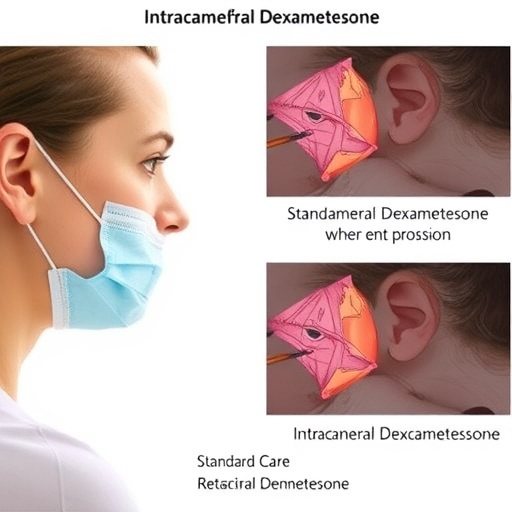
In the field of ophthalmology, ongoing research consistently aims to enhance patient outcomes following cataract surgery, a procedure that remains one of the most prevalent surgical interventions worldwide. As with any surgical procedure, managing inflammation and ensuring optimal recovery are critical components for patient satisfaction and visual restoration. A groundbreaking study conducted by Diakonis and colleagues introduces an innovative approach using intracameral extended-release dexamethasone for the management of postoperative inflammation, potentially redefining the standard of care in this domain.
Cataract surgery typically involves the extraction of the cloudy lens, followed by the implantation of an artificial intraocular lens. While the procedure is generally safe and effective, postoperative inflammation can complicate recovery and affect visual outcomes. Traditionally, patients are prescribed a regimen of topical steroids and non-steroidal anti-inflammatory drugs to manage this inflammation. However, compliance with medication regimens can be challenging, leading investigators to explore alternatives that provide more controlled drug delivery mechanisms.
The research presented in the study compares the effectiveness of traditional postoperative care against a novel approach utilizing a 9% dexamethasone suspension placed directly in the capsular bag—an innovative technique that promises sustained drug delivery and improved patient outcomes. This randomized controlled trial took place in a contralateral setting, meaning the study involved two distinct but related groups of patients, each receiving different treatments to evaluate efficacy in real time.
.adsslot_OL13mcMkWQ{width:728px !important;height:90px !important;}
@media(max-width:1199px){ .adsslot_OL13mcMkWQ{width:468px !important;height:60px !important;}
}
@media(max-width:767px){ .adsslot_OL13mcMkWQ{width:320px !important;height:50px !important;}
}
ADVERTISEMENT
One of the most striking aspects of this study is its design, which employs the contralateral eye as a control. This method minimizes inter-patient variability and amplifies the reliability of the results by allowing each patient to serve as their own control. The use of the capsular bag as a location for drug placement is particularly intriguing, as it ensures localized delivery of the anti-inflammatory agent, theoretically maximizing its efficacy while minimizing systemic absorption.
The incorporated 9% dexamethasone suspension is noteworthy due to its extended-release capabilities. Traditional dosage forms often require frequent administration to maintain therapeutic levels, which can be particularly burdensome for patients recovering from surgery. The new suspension formulation aims to mitigate this effect, allowing for a sustained release over time which may lead to improved adherence and more consistent patient outcomes.
During the trial, key metrics were measured to assess the anti-inflammatory effectiveness of the dexamethasone suspension, including postoperative inflammation levels, visual acuity, and overall patient comfort. The primary endpoint was the degree of inflammation within the first few weeks post-surgery, as this period is critical for the healing process. Secondary endpoints included patient-reported outcomes, such as satisfaction with visual performance and the overall ease of the recovery process.
Initial findings from the study have been promising, suggesting that the extended-release formulation effectively reduces postoperative inflammation in comparison with the standard topical therapies. Not only was there a decrease in inflammatory markers, but patients also reported a more streamlined recovery experience, with less frequent follow-ups required for medication adjustments or interventions associated with complications linked to inflammation.
Furthermore, the researchers meticulously considered potential adverse effects associated with intracameral dexamethasone administration. While concerns around intraocular pressure and potential complications linked to corticosteroid use must be acknowledged, the study appears to have recorded a favorable safety profile, further supporting the utility of this novel approach.
The implications of these findings extend beyond improvements in patient recovery. By reducing the reliance on topical medications and improving adherence through innovative drug delivery systems, healthcare costs may be optimized. This could lead to fewer postoperative visits, reduced incidences of complications arising from poor medication adherence, and overall enhanced procedural efficiency in ophthalmic practices.
Another dimension to consider is the broader application of such extended-release methodologies to other ocular surgeries or conditions. If proven effective, similar strategies could be explored for glaucoma management, retinal surgeries, or even in the treatment of ocular surface diseases. This research opens the door to a new paradigm in the management of postoperative care in ophthalmology.
As we move towards a future where personalized medicine meets the technical advancements of drug delivery systems, studies like that of Diakonis et al. become pivotal. They not only provide immediate benefits to patient care but also serve as a foundation for ongoing research and innovation in the field, pushing for better surgery outcomes and more satisfied patients.
In conclusion, Diakonis et al. have highlighted an exciting advancement in postoperative care for cataract surgery patients through their exploration of intracameral dexamethasone. By demonstrating the potential for enhanced outcomes while addressing key challenges in patient adherence to traditional regimens, this study could inspire a shift in clinical practices and encourage further investigations into similar therapeutic strategies across various ophthalmic procedures.
This transformative research stands to reshape the narrative around postoperative management and reinforces the essential role of innovation in continually improving patient care in ophthalmology. As the outcomes of the study are further scrutinized and confirmed through broader clinical application, the future of cataract surgery and postoperative recovery may very well
be changed for the better.
Subject of Research: Postoperative management of inflammation in cataract surgery using intracameral extended-release dexamethasone.
Article Title: Contralateral Randomized Comparison Between Intracameral Extended-Release Dexamethasone 9% Suspension Placed in the Capsular Bag with the Established Post-Cataract Regimen.
Article References: Diakonis, V.F., Kymionis, G.D., Tsaousis, K.T. et al. Contralateral Randomized Comparison Between Intracameral Extended-Release Dexamethasone 9% Suspension Placed in the Capsular Bag with the Established Post-Cataract Regimen. Adv Ther (2025). https://doi.org/10.1007/s12325-025-03306-4
Image Credits: AI Generated
DOI:
Keywords: Cataract surgery, postoperative inflammation, extended-release dexamethasone, randomized controlled trial, ophthalmology.
Tags: capsular bag drug delivery methodcataract surgery recovery strategiescompliance with postoperative medicationeffectiveness of topical steroidsextended-release dexamethasone benefitsimproving visual outcomes after surgeryinnovative drug delivery in surgeryintracameral dexamethasone in cataract surgerypatient outcomes in cataract surgerypostoperative inflammation managementrandomized controlled trial in ophthalmologystandard care in ophthalmology





